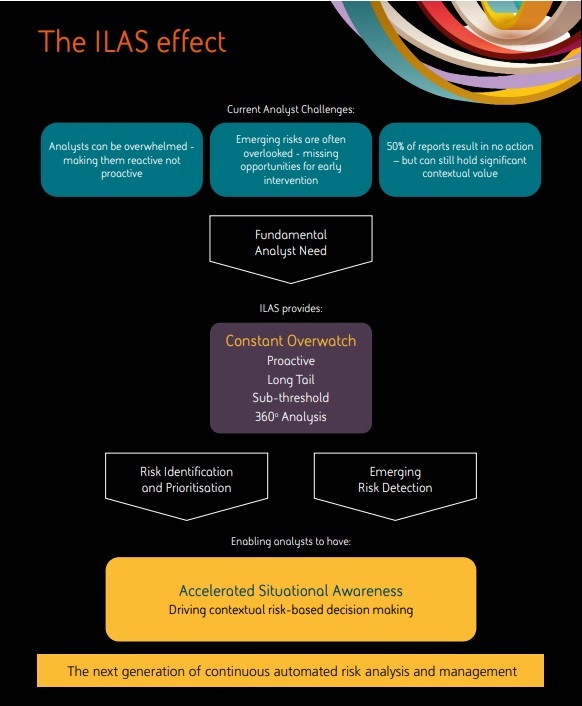At BAE Systems Digital Intelligence, we set about trying to address these challenges by building an entirely new type of system, one that replicates the way that people work with complex data, to provide a prioritised threat and risk detection system, that is easy to consume, fully traceable and explainable. This is how that journey began.
Although analyst teams know what ‘risk’ looks like for them, they don’t have the tools and bandwidth to assess this vast wealth of data to appropriately identify risks and build a better idea of behaviours that add to the bigger picture.
Back in 2020, BAE Systems Digital Intelligence noticed analysts, particularly in the policing domain, were becoming increasingly overwhelmed by the amount of data they had access to.
Although analyst teams know what ‘risk’ looks like for them, they don’t have the tools and bandwidth to assess this vast wealth of data to appropriately identify risks and build a better idea of behaviours that add to the bigger picture. Put simply: they don’t know how to manage the wealth of information at their fingertips. They nevertheless still expend significant effort and cost, yet constantly run the risk of missing something highly significant. However, more analysts doesn’t necessarily solve this problem as the data pools continue to grow exponentially. A digital approach was needed.
ILAS (the Intelligence Lead Assessment Service) is BAE Systems Digital Intelligence’s answer to this challenge in the policing domain. It brings the much-needed digital approach to topics such as child safeguarding; domestic abuse, firearms, offender management and professional standards.
ILAS is a solution that automates the manual risk assessment, prioritisation and monitoring that takes place across increasingly strained policing departments each day, making use of a force’s historic information to support the latest information that’s arrived.
Adaptable for a range of different use cases, its overarching impacts include:
- Keeping people safer by ensuring that even the smallest indicators of risk to a person are picked up and understood in their true context
- Relieving pressure on analysts making complex, high stakes decisions with limited time
Proactive policing
Processes within forces are often reactive, with overworked teams only having time to look at the most recent or serious events. However, often the data is available to gain insights into the bigger picture, enabling forces to get ahead of developing issues by putting potential behavioural triggers in context.

The lure of ILAS comes from its ability to continuously assess risk 24/7 – putting new information in context to identify, prioritise and monitor real-world situations – all using the nuanced and complex tradecraft of experienced analysts. Ultimately, it proactively makes sense of data so it can be acted upon quickly.
Doing more with less
ILAS has the ability to improve productivity by an order of magnitude, bringing all relevant data to a person’s eye line without all of the manual (and therefore, error-liable) effort in the background.
ILAS has the ability to improve productivity by an order of magnitude, bringing all relevant data to a person’s eye line without all of the manual (and therefore, error-liable) effort in the background.
Moreover, ILAS is able to scan a wide breadth of real-world situations playing out, monitoring the risk associated with them. Rather than prioritising a top 10, 20 or 50 suspects, automation allows for a more thorough, efficient, accurate and stress-free approach to risk that can facilitate harm prevention through early intervention, and maximise use of data.
The potential across the solution’s full range of applications is vast. Once deployed, it can be the most significant of digital interventions.
Lightbulb moments – bringing users together with technology
The first stage of ILAS’ development was to bring together technical people and front-end users, specifically those working to protect children at risk of exploitation. From these conversations, a matrix of possible use cases began to evolve.
Subject matter experts from a range of policing departments and disciplines presented the way they work with data now, the key objectives they have, and the restraints they experience in meeting those targets.
Subject matter experts from a range of policing departments and disciplines presented the way they work with data now, the key objectives they have, and the restraints they experience in meeting those targets. In each conversation, lightbulb moments continued to occur, and – in return – BAE Systems presented how ILAS could specifically remedy their challenges. This not only included how ILAS would build inference and derive meaning from the data across existing systems, but how it could also then be presented to end-users in a readable and transparent way.
Combatting child exploitation requires the ongoing monitoring of people, locations and situations to identify potentially problematic situations, and to see both current and emerging risk to young people. Given the importance of this area of policing, staff work tirelessly to keep on top of data to detect risk, identify criminality and intervene accordingly. Upon hearing that this could be done without such a high level of manual input, delivering a real-time complete picture, the interest was clear to be seen.
The benefit of ILAS, however, is that it can be quickly adapted to any number of use cases.
Its capabilities have now been further directed towards insider threat and counter-corruption, firearms licensing and domestic abuse – the list continues to grow.

Overview of the challenges that ILAS addresses by providing continuous automated risk analysis and management.
Investing now for a sharper axe
The adoption of this technology requires a mind-set shift in ways of working.
Where a force has been undecided about adopting new technology and moving to a digital approach, this isn’t because of any denial of the capabilities of a system such as ILAS. Rather, it is an indictment of how time-limited and financially strained the sector is at present.
There is a famous analogy where a woodman has to occasionally stop chopping a tree to sharpen their axe. At present, a challenging question to the UK’s police could be – are they continuing to strike with a blunt tool rather than risk losing the time to integrate a more fit-for-purpose instrument that would get them to a better result?
To use an even more common analogy, there is a ‘chicken and egg’ standoff right across policing where forces drastically need to become efficient, but often lack the time and resources to explore new opportunities which could make the difference. The cycle of inefficient and sub-optimal operations continues.
Unlocking information advantage
Any new integration requires a certain leap of faith, the potential for teething errors, a change in behaviours from staff, a progression of culture and an acknowledgement of disruption. In this case however, the impact and the urgency of the need for change, together with the speed at which these integration points can be overcome with this clear motivation, makes ILAS too potent to overlook.
ILAS is deployed operationally in a growing number of forces, presenting situations back to users that may otherwise have passed unnoticed.
The payoff of improving critical police processes, removing the strain of constantly and manually assessing data pools that continue to grow, and making societies immeasurably safer as a result, are in turn making the sector more attractive and manageable for personnel. All of which creates a real incentive to accelerate the process of adoption and make change happen.
ILAS is deployed operationally in a growing number of forces, presenting situations back to users that may otherwise have passed unnoticed. To find out more, please follow the link below or contact the author.
We are Digital Intelligence
BAE Systems Digital Intelligence is home to 4,800 digital, cyber and intelligence experts. We work collaboratively across 16 countries to collect, connect and understand complex data, so that governments, nation states, armed forces and commercial businesses can unlock digital advantage in the most demanding environments. Launched in 2022, Digital Intelligence is part of BAE Systems, and has a rich heritage in helping to defend nations and businesses around the world from advanced threats.
Contact us to learn more about ILAS and get a personalised demo baesystems.com/ILAS



